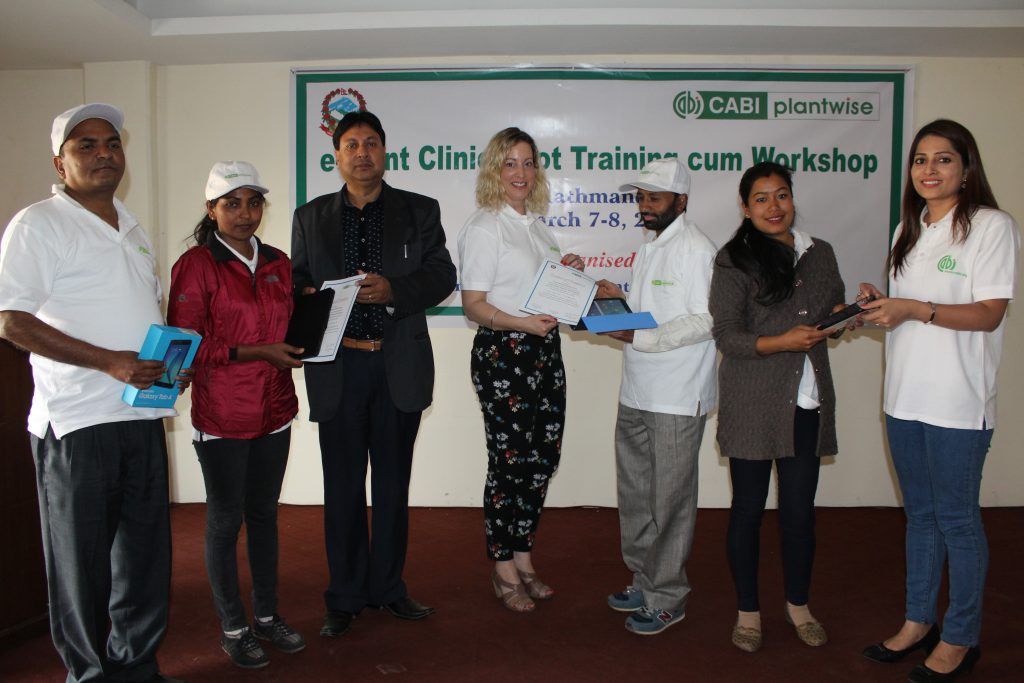Pest Risk Information Service for sub-Saharan Africa
The FAO estimates that up to 40% of global crop yields are reduced each year due to the damage caused by pests (FAO, 2015). Crop losses have a huge impact on the livelihoods of smallholder farmers. They result in less food for them and their families and a lower income for spending on education and…
CABI working with Partners to Manage Fall Armyworm in Kenya
Kenya has launched a campaign to control the Fall Armyworm, (FAW) which has been sighted by farmers feeding on Maize in Trans Nzoia County, Kenya. Agriculture Cabinet Secretary Mr. Willy Bett said the pest poses a serious threat to the country’s food security situation. “Its impact will be severe given that the country is just…
Five invasive pests cost African economy $1 billion every year
New research by CABI reveals that just five invasive alien species are causing US$0.9 – 1.1 billion in economic losses to smallholder farmers across six eastern African countries each year, equating to 1.8% – 2.2% of total agricultural GDP for the region. These losses are expected to grow to $1.0 – 1.2 billion per year…
South-South collaboration helps in the fight against invasive pests
Invasive species cause widespread devastation and huge economic losses to smallholder farmers across the world, especially in sub-Saharan in Africa. Invasive species not only directly undermine farmer’s ability to achieve food security, they also affect smallholder agribusiness making farmers unable to link to profitable food value chains and international agricultural trade networks.
Reinforcing the Plant Health System in Trinidad and Tobago
On the 6 of March 2017, the Honourable Minister of Agriculture Land and Fisheries of Trinidad and Tobago, Mr Clarence Rambharat, and his team met with CABI Plantwise Regional Coordinator, Dr. Yelitza Colmenarez and with the USDA representative for the Caribbean Mr. Wayne De Chi , in order to review and restructure Plantwise activities in…
Challenges and Opportunities for Women Farmers in Nepal
In developing countries, rural women play a significant role in agriculture, accounting for 60-80% of food production and selling food products at markets [1]. In Nepal, it’s been reported that up to 98% of women are employed in the agricultural sector, a percentage which is higher than that for men (91%) [1b]. Contribution by women…
Why the green peach aphid is such a successful pest
Recent research highlights why the green peach aphid (Myzus persicae) is one of the most successful crop pests. These findings will help further the development of effective management and control measures which will ultimately reduce worldwide crop losses.
Agriculture and food security — where are we headed in 2017?
By Lisa Cornish. Reblogged from DEVEX. As climate change impacts the global ability to grow food, both in quality and quantity, researchers in agriculture have become an important asset for establishing long-term food security as the world’s population continues to increase. In December, agriculture and food security researchers visited Canberra for high-level discussions on development…
Tune in to the Cassava show
Last week in the Nkhotakota region of Malawi a new radio show went on air. Not a news programme or a music show, but a show devoted to Cassava. Sounds pretty specific? Well, it’s even more focussed than that. The weekly 30 minute programme is actually focussed on managing one of Cassava’s most damaging diseases…


